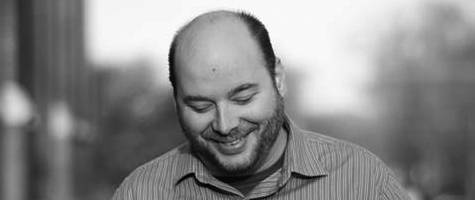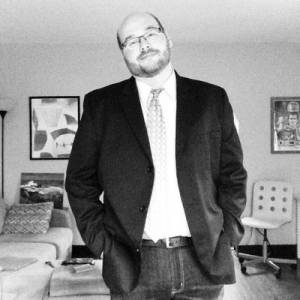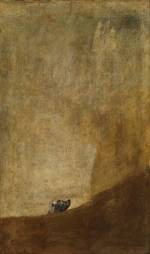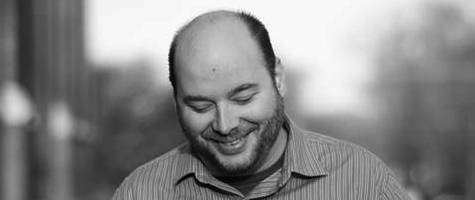If you haven’t happened to run into Matthew Minicucci over the past year, I’d be fairly surprised. As a previous organizer for the Pygmalion LitFest, he was pretty much everywhere anything was being read during PygLitFest2015. On top of that, he was an instructor at the University of Illinois, a reader at Stories & Beer, and he also appeared on SP Radio. In fact, it hasn’t been that long since he was interviewed by Smile Politely regarding his award-winning book of poetry that we also reviewed, but somehow it was long enough for him to get:
- A new town
- A new job
- A newly designed website
- A new writing style
- A new book
Seems like maybe those developments – as well as being a featured reader and multi-participant at Pygmalion LitFest – merits a new interview. It was slightly off-putting, though, because I was basically just going to cut’n’paste rearrange things from all those other articles and put it up here to save time during Pygmalion week. Here’s how I was hoping this interview would go:
SP: What’s new, Matthew?
Minicucci: Eh, not much really. Just chilling out here in Oregon, but ssdd, you know?
SP: Cool.
Instead, keep reading to find out actual new real things about what’s been going on in the life of this X-C-U favorite.

SP: What’s new, Matthew?
Minicucci: I did just move, so I can talk a bit about that, if you’re interested. My next book, titled Small Gods, will be out in fall of 2017, so you could totally ask about that. I have a re-designed website. I started writing Creative Nonfiction essays, it’s one of the things I’m working hardest on because I’m also moderating the talk with Eula Biss at PygLitFest. It’s also a new direction for me, so I’d love to talk about that.
SP: Ohhhh-kay, Chatty Cathy, sure. I’m game. Let’s talk. You’ve laid it out so neatly for me, let’s start with the move. So, did Rauner scare you out of state, or what?
Minicucci: I won’t lie and say the Rauner climate wasn’t a factor in deciding to leave; I just hope the pervasive anti-spending, neo-con, anti-state schooling attitude flames out soon, or you’re going to see a lot of very bad things in the near future.
I will say thanks to to the Non Tenure Faculty Coalition Local #6546 Union – they have made great strides at UIUC with special help from Shawn Gilmore, among many others.
No, actually, my partner got a tenure-track job at Pacific University, near Portland, and there are a lot of opportunities for non-University creative writing instruction out there. It seemed like a great opportunity for me to follow her in support, and to try something new in terms of my own work: namely, dedicating myself to nearly full-time writing.
SP: Full-time writing… in a new area, I hear (from you). What led you to venture into the realm of Creative Nonfiction?
Minicucci: Well, it seemed like a very natural transition, actually. My first book, Translation, really examined the dissolution of my nuclear family through the lens of classical myths and historical figures (among other things). In the collection, there’s a lot of attention paid to the prose poem as an important form. My second (forthcoming) collection, Small Gods, takes this even further and is more than 75% prose poems, mostly focusing on the dissolution of relationship in the context of how we communicate (symbolically and ritualistically) in science and in faith (and what happens when that communication breaks down).
Moving to CNF made a lot of sense to continue discussing things like family, history, loss of faith, etc. Especially since I’ve been working in brief essays, usually shorter than 2000 words (and sometimes as small as 750 words).
SP: Back up – what exactly is “Creative Nonfiction”? Are we talking something like narrative non-fiction (The Devil In White City, or A Walk in the Woods), or blogging, or something else entirely? Actually, the entire term seems like an oxymoron, yet might actually apply to every article I’ve ever written for SP.
Minicucci: [shout-out? Shout-out, anyone? – ed.] It’s a difficult question, and if you asked any of my CW 243 students at UIUC over the last couple of years, they would be sympathetic to the confusion.
I would argue Creative Nonfiction (CNF) is the continuation of the essay as a literary genre (hello Michel de Montaigne!), where classic techniques of both prose and prosody are employed to shed some light on a nonfiction subject.
In this way, CNF could have narrative and plot as a major structural component, or could be more interested in lyricism, melody, rhythm, or collage as structure. Or, some combination of the two.
I would say your statement about the connection between journalism and CNF is an important one, and not at all off-base. If you read (former Pygmalion featured reader) Jennifer Percy’s most recent article in The New York Times Magazine you can see, yes, it’s reporting, but it’s also literature (and employs techniques and rhythms you’d see in more “creative” work).
In short: it’s fucking complicated.
 SP: Sounds it. So the new book will be CNF? Or is it poetry? Maybe you should just talk about it for three sentences and mention whether or not we will hear material from it during your Pygmalion LitFest appearance.
SP: Sounds it. So the new book will be CNF? Or is it poetry? Maybe you should just talk about it for three sentences and mention whether or not we will hear material from it during your Pygmalion LitFest appearance.
Minicucci: Small Gods is definitely a collection of poetry, but with a tremendous reliance on the prose poem as a dominant form in the work. As I said earlier: I think the prose poem and CNF have more connections than we might initially think.
I will definitely be reading pieces from the forthcoming book during my reading with Tyehimba Jess, so yes, everyone will get a preview of the new work.
SP: You mentioned that you’ll be involved with the Eula Biss conversation, and she also began as a poet and transitioned to nonfiction. Is your plan to take on some hot-button, soap-box issues like vaccination?
Minicucci: That’s a great question. I would love to make a similar transition (though perhaps transition is the wrong word, as I definitely see myself writing both essays and poems for the foreseeable future).
Will that work be about hot-button issues? I can’t really say. I am starting to engage with a lot more work that involves being “on-site” and reportage, but right now most of the work I’m spending time on is still more of the “personal essay” variety.
SP: Seriously, man, you just left. Still, I’m guessing that your performances may have been arranged before your plans to move, but what are you looking forward to most about your triumphant return to the town and to Pygmalion LitFest?
 Minicucci: I did know about the scheduled appearance right before I left, yes. It was a kind and welcome surprise. I didn’t think I would get a chance to come back so soon.
Minicucci: I did know about the scheduled appearance right before I left, yes. It was a kind and welcome surprise. I didn’t think I would get a chance to come back so soon.
The best part of returning will 100% be seeing everyone I miss, a myriad list of beautiful and talented CU people.
Only slightly below that would be the chance to eat at Black Dog again. The food in Portland is great, but there’s only one Black Dog.
I’m extremely excited and honored to be a part of the festival this year as a featured reader. I hope everyone will come to the reading(s) and say hi when they get a chance.
—
Matthew Minicucci will be reading before Tyehimba Jess at the Accord on Friday night, September 23rd, a little after 6:30 p.m.-ish. You can also catch him hosting the Eula Biss conversation on Saturday, September 24th, at 4 p.m. also inside the Accord. Knowing his close relationship with the PygLitFest folk, I am sure he will pop up here, there and everywhere else during the weekend. Like all LitFest events, all of the things featuring Matthew Minicucci will be FREE.








